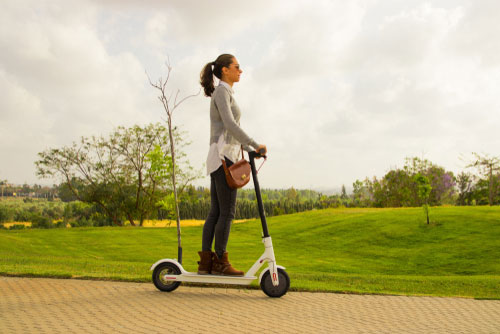Are electric scooters eco-friendly? What is the environmental impact of electric scooters compared to other means of transport? Can they be part of a sustainable transportation system? Let’s take a look at what recent studies say.
Over the last months, app-shared electric scooters have been blooming in many of the world’s largest cities. In theory, they provide a convenient, on-demand, accessible transportation for everyone to get around with electricity, which, as we know, is normally less polluting than gasoline or other fossil fuels.
Yes, that’s true – but it is not that simple! As always, when it comes to environmental impact, before saying one technology is more eco-friendly than another, a couple of questions need to be answered.
What is the hidden pollution electric scooters generate (for example during their manufacturing or while being powered with electricity? What are the real extra benefits that come along with it compared to other already existing technologies? How long is its lifespan, i.e., for how long is it expected to last? How is it recycled at the end of its lifecycle? When compared to other means of transport that were already here, are electric scooters more ecological?
Electric Scooters: An Ecological Impact That’s Still Unkown

This debate of what’s the more ecological means of transport has been very controversial, especially with the recent growth of the global electric cars’ market share. Some accuse electric cars of being actually more polluting than the conventional fossil-fuel-powered cars, securing their arguments in the production and (lack of) recycling of the lithium-ion batteries. Others focus on the extraction of rare metals or on the production of electricity in countries with oil or coal-based grids.
Others say it is more eco-friendly because it reduces emissions during the use phase, meaning driving, especially if it is coupled with decarbonized energy (a renewable energies based electricity grid). Today, with the multiplication of scientific studies on this subject, we are almost certain that yes, the electric car is more environmentally friendly than diesel or gasoline car in virtually all cases.
But for the electric scooters, it’s more complicated. Indeed, the phenomenon is recent and we still have a little perspective on all the impacts they encompass. Although they’re starting to grow, not many reports have looked at the question. Still, some studies have attempted to evaluate the impacts of electric scooters, especially under self-service conditions. So here is what we can say today, considering the state of our knowledge on this subject.
The Environmental Impact Of Electric Scooters

As for all means of transport, if we want to measure the environmental impact of electric scooters, it is necessary to analyze the 4 main phases of its life cycle. The first two are the phases of the vehicle’s manufacturing (then the engine and other components are assembled) and the energy production phase of the vehicle (how polluting is the energy that enables the vehicle to be driven). Then comes the use phase of the vehicle (when it is driven) and then the maintenance and end of life of the vehicle (how it is maintained and recycled or destroyed when it no longer works). In each of these phases, there are different environmental impacts.
For electric scooters, it’s a bit like electric vehicles. In the production phase, we must take into account all the energy consumed to extract raw materials, transform them, assemble them… This stage is important for all electronic devices because it is where the battery (that’s very polluting) is considered.
Concerning the production of energy phase, again, electrical scooters have issues similar to the ones of electric cars. If the electricity is produced in an ecological way (renewable or decarbonated energy), then the environmental impact of this phase will be lower. On the other hand, if it is produced from fossil fuels burning (such as coal, oil or gas), the ecological impact, and especially the amount of released greenhouse gases, increases.
Next, the use phase is crucial for electric scooters and electric vehicles in general, because that’s where they have a real advantage. In fact, during the use phase, electric vehicles (including scooters) do not pollute. That’s right, there are no CO2 or other polluting emissions – only particles related to braking. This means that the longer electric scooters (or electric cars) are used, the more ecological advantage they get. However, it is also necessary to count on how they are recharged. Scooters, for example, need to be brought to a charging station and this transportation, usually done by trucks, can have a significant impact on the overall math.
Finally, recycling is also important because electric scooters are made of rare and potentially polluting materials. It is, therefore, necessary to take care of their batteries (and the vehicle cell itself), which makes them accountable for a great slice of pollution they can’t run away from – at least until the battery-recycling industry gets more developed.
Electric Scooters: Not So Eco-Friendly

Today, the main study analysing these different phases for electric scooters is one published by North Carolina State University. According to the scientists who conducted it, electric scooters are not really an eco-friendly means of transportation today. In fact, regarding the carbon footprint, scooters emit about 202 g of CO2 per km and per passenger over their entire life cycle. It’s about as much as a conventional car and 3,5 times more than an electric car.
Why these results? First, because the manufacturing phase is quite heavy: it is necessary to build a battery for each scooter that then only allows for the transportation of one person. Ultimately, 50% of the carbon impact is linked to the vehicle’s production. The second biggest problem is charging electric scooters. Indeed, they must be collected and moved to be recharged, and that means using trucks that emit CO2. This weights heavily on the balance sheet: 43% of greenhouse gas emissions are linked to recharging. In the end, the production of energy represents a little less than 5% of the GHG balance of electric scooters.
But the main problem of electric scooters is ultimately the way they are used. Indeed, to obtain this result, scientists assumed scooters had a lifespan of about 1 year. This short period considerably increases the negative ecological impact of scooters, because as they’re only used for a few hundred kilometers, the negative impact of batteries isn’t that much diluted. Alternatively, when producing a car, it is used for years and usually and around 200,000 km or more get covered.
Moreover, researchers noted that the main lever to reduce the environmental impact of scooters is to extend their lifespan. Thus, if we used these scooters for 2 years, they’d emit 141 g of CO2 per km per passenger (which is still 2 times higher than driving in an electric car). However, according to the first available data, currently in real conditions electric scooters have a life of less than 1 month (in Kentucky’s reality) as they get broken, thrown into rivers or poorly maintained – making them last for a little time. So while the shared, on-demand mobility gets trendier and grows, it’s important that electric scooters are used in a civilized way away. This would make them last longer and become a more ecological alternative.
Electric Scooters: What’s Their Place In The Sustainable Mobility System?

All this invites us to question the relevance of these types of vehicles. What are they really for? What is their actual use? This is what really determines the ecological relevance of a means of transportation. Indeed, a vehicle or a means of transport is never ecological in itself. It is environmentally friendly only when it makes it possible to meet a mobility need in a more ecological way than the means of transport we already have (walking, cycling, public transport or private vehicles).
But in the case of electric scooters, the question of what is their use is still unclear. In the majority of cases, using an electric scooter does not replace a more polluting alternative. Presumably, those who generally travel by car aren’t giving up on their vehicles and replacing them for electric scooters: there are already better alternatives to travel long distances such as public transport or even cycling. And in fact, many times, electric scooters replace other, more ecological transports like cycling, walking, buses or subways. And since they emit more CO2 than these different modes of transport, electric scooters tend today to increase the global carbon footprint of the mobility sector.
In summary, electric scooters are ecologically relevant only when they replace more polluting means of transport such as cars – a scenario that is likely uncommon. If we want electric scooters to fit into a system of mobility and sustainable transportation, we must first and foremost:
- Extend their lifespan and use them in a more civilized and careful way so that they last longer;
- Improve the charging infrastructure (to avoid using conventional vehicles to recharge them);
- Not use them to replace trips already doing good when it comes to carbon emissions: such as public transport, walking or cycling
It’s not easy! There are probably some scenarios where it may make sense to use electric scooters, especially for people using different transports to get to their destination – but this isn’t the case for the majority of users. In a scenario where public transportation works well and efficiently and it’s the main way of moving around in a city that’s not privileging cars, using electric scooters may be interesting. But today most cities are still car-oriented.
Or should we rather see it from a perspective where the goal is to start preparing people for a smart, interconnected public transportation network, where individual-owned cars are left behind, and where electric scooters are an alternative to get to specific locations where subways, trams or buses don’t get to? But even then bikes could do a better job. Unless it’s a long way up – then we’d have to analyze electric bikes too and compare both. But in the way mobility in cities is designed today, there are more eco-friendly alternatives to electric scooters from sharing platforms.
Image credits to scooter on Shutterstock, riding on Shutterstock, man on Shutterstock and street on Shutterstock and Lucian Alexe on Unsplash

